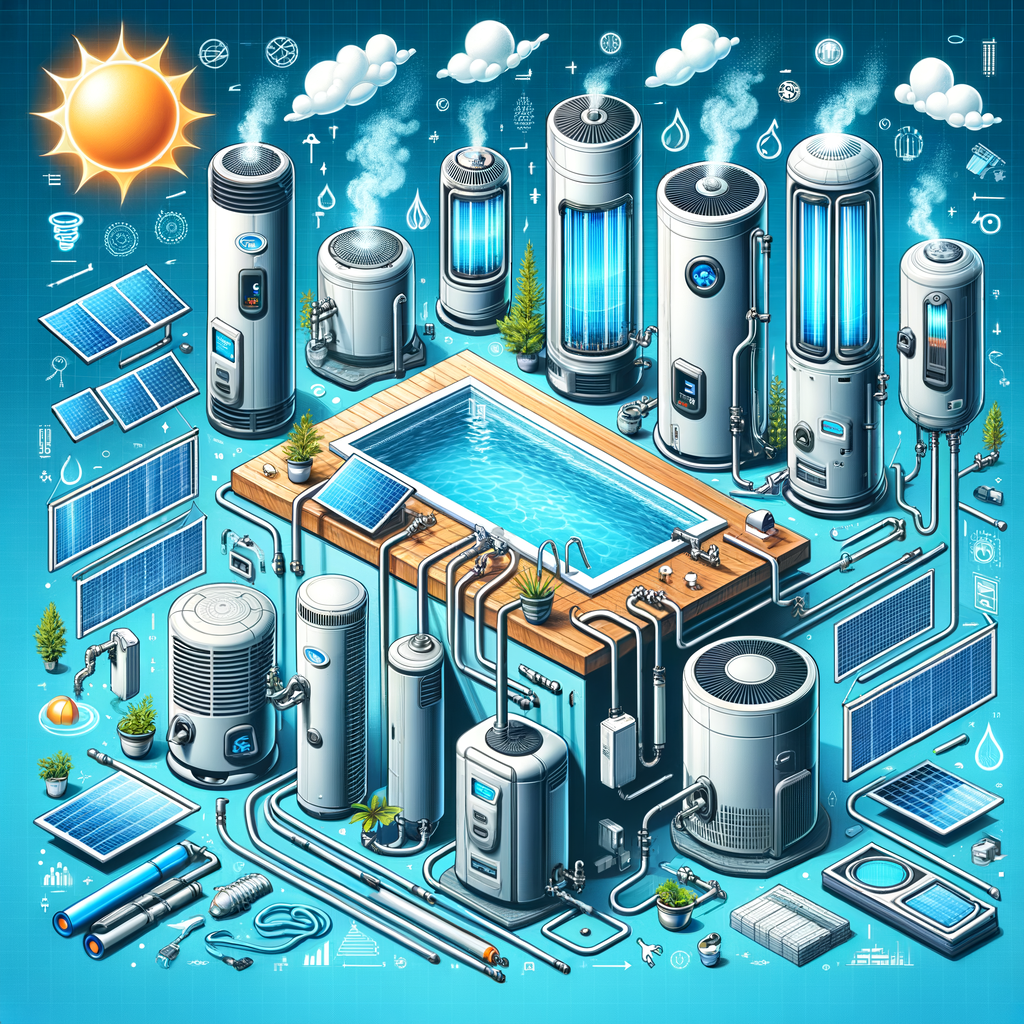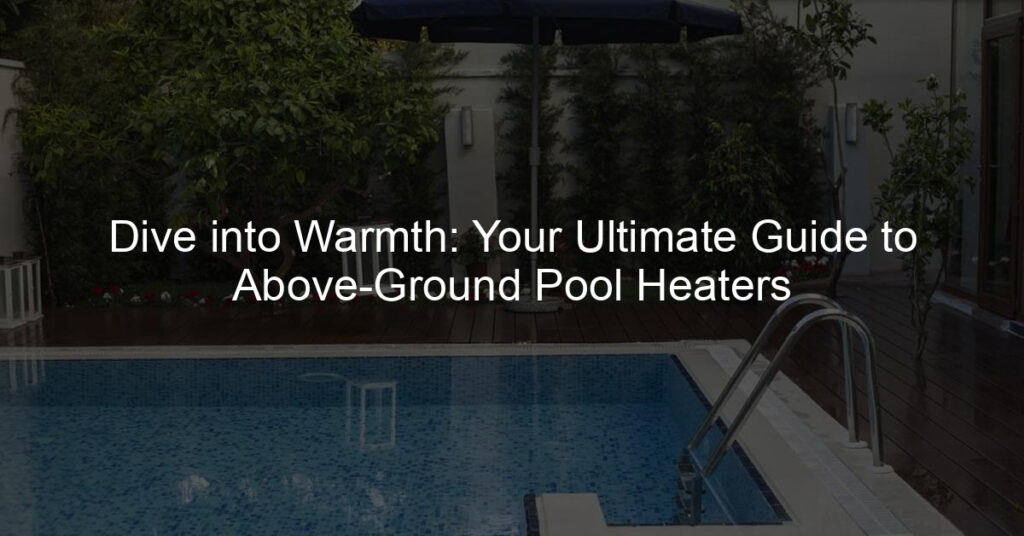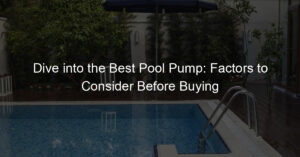
Introduction to Above-Ground Pool Heaters
Swimming is a fun and relaxing activity that many people enjoy. But when the water is too cold, it can be uncomfortable and even unhealthy. That’s where pool heaters come into play. In this section, we will delve into the world of above-ground pool heaters, their importance, and benefits.
-
- Understanding the Importance of Pool Heaters
Pool heaters are essential for maintaining a comfortable water temperature, especially during colder months. They work by transferring heat from a source, like the sun or gas, to the pool water. This allows you to extend your swimming season and enjoy your pool even when the weather is chilly. Without a pool heater, your swimming pool would be too cold to swim in for a significant part of the year.
-
- Benefits of Using Above-Ground Pool Heaters
Above-ground pool heaters offer several advantages. First, they are generally more affordable and easier to install than in-ground pool heaters. This makes them a great option for pool owners on a budget. Second, they are portable and can be moved easily if you decide to relocate your pool. Finally, above-ground pool heaters are available in a variety of types, including solar, electric, and gas heaters. This gives you the flexibility to choose the one that best suits your needs and preferences.
In the following sections, we will explore different types of above-ground pool heaters, their installation process, energy efficiency, and maintenance tips. So, whether you are a new pool owner or looking to upgrade your current heating system, this guide will provide you with the information you need to make an informed decision.
Types of Above-Ground Pool Heaters
There are several types of above-ground pool heaters available in the market. Each type has its unique features, benefits, and drawbacks. In this section, we will discuss solar pool heaters.
Solar Pool Heaters
Solar pool heaters are an eco-friendly and cost-effective way to heat your above-ground pool. They use the power of the sun to warm the water in your pool.
-
- How Solar Pool Heaters Work
Solar pool heaters work by pumping pool water through a series of tubes, often called a solar collector, that are heated by the sun. The heated water is then returned to the pool. This process continues until the pool reaches the desired temperature.
-
- Advantages and Disadvantages of Solar Pool Heaters
Like any product, solar pool heaters have their pros and cons. Let’s explore them:
| Advantages | Disadvantages |
|---|---|
| Environmentally friendly | Dependent on sunlight |
| Cost-effective in the long run | Initial installation can be expensive |
| Low maintenance | May require a larger area for installation |
In conclusion, solar pool heaters can be a great choice for those who want an environmentally friendly and cost-effective way to heat their pool. However, they may not be suitable for everyone, especially if you live in an area with limited sunlight or have limited space for installation.
Electric Pool Heaters
Electric pool heaters are a popular choice for many pool owners. They are a type of above-ground pool heater that uses electricity to heat the water. Let’s delve deeper into understanding electric pool heaters and their pros and cons.
- Understanding Electric Pool HeatersElectric pool heaters, also known as heat pumps, work by extracting heat from the air and transferring it into your pool water. They are energy-efficient and can maintain a consistent pool temperature, regardless of the weather.These heaters have a fan that draws in the outside air and directs it over an evaporator coil. Liquid refrigerant within the evaporator coil absorbs the heat from the air and becomes a gas. The warm gas in the coil then passes through the compressor, which increases the heat. This hot gas then passes through the heat exchanger, transferring the heat to the pool water.
- Pros and Cons of Electric Pool HeatersLike all pool heaters, electric pool heaters have their advantages and disadvantages. Let’s take a look at some of them.
Pros Cons Energy-efficient Higher upfront cost Can heat pool in any weather Requires professional installation Long lifespan May require more time to heat the pool Despite the higher initial cost, electric pool heaters can save you money in the long run due to their energy efficiency. They are a great choice if you want a comfortable pool temperature all year round.
Gas Pool Heaters
When it comes to heating your above-ground pool, gas pool heaters are a popular choice. Let’s delve into the world of gas pool heaters and explore their advantages and disadvantages.
- Insight into Gas Pool Heaters
Gas pool heaters work by burning natural gas or propane in a combustion chamber. The heat generated is then transferred to the pool water, raising its temperature. They are known for their speed and efficiency, capable of heating a pool in several hours, regardless of the outside temperature.
Gas heaters are ideal for pools that aren’t used regularly because they can quickly heat a pool, meaning energy isn’t wasted keeping the pool warm all the time. They are also a great choice for those who live in colder climates or want to use their pool year-round.
- Benefits and Drawbacks of Gas Pool Heaters
| Benefits | Drawbacks |
|---|---|
| Fast heating time | Can be costly to operate |
| Works in any temperature | Requires a gas line or propane tank |
| Good for infrequent use | Not as energy-efficient as other types |
As you can see, gas pool heaters offer quick and efficient heating, making them perfect for those spontaneous pool parties or chilly evenings. However, they can be more expensive to operate due to the cost of gas. They also require a gas line or propane tank, which can add to the initial installation cost.
While they may not be as energy-efficient as solar or electric heaters, their ability to heat a pool quickly and in any weather conditions makes them a popular choice for many pool owners.
Best Above-Ground Pool Heaters
When it comes to swimming pool heaters, there are several options available. Each type of heater has its own strengths and weaknesses, and the best one for you will depend on your specific needs and circumstances. In this section, we will review the top solar, electric, and gas pool heaters on the market.
-
Review of Top Solar Pool Heaters
Solar pool heaters are a great option for those who are environmentally conscious and want to save on energy costs. They use the power of the sun to heat your pool, making them a green and cost-effective choice.
One of the top-rated solar pool heaters is the SolarPro Curve Solar Heater. This heater is designed for above-ground pools and uses a unique curved design to maximize the amount of sunlight it captures. It’s easy to install and can raise your pool’s temperature by up to 5 degrees in just 4 days.
Another top choice is the GAME SolarPRO Contour Solar Pool Heater. This heater is also designed for above-ground pools and uses a dome design to capture and magnify the sun’s rays. It’s compact and easy to install, making it a great choice for smaller pools or those with limited space.
-
Review of Top Electric Pool Heaters
Electric pool heaters are a reliable and efficient way to heat your pool. They use electricity to generate heat, which is then transferred to your pool water.
The Hayward HP21404T HeatPro Titanium is a top-rated electric pool heater. It’s designed for both in-ground and above-ground pools and features a titanium heat exchanger for maximum heat transfer. It’s also energy-efficient and operates quietly, making it a great choice for those who want a powerful but unobtrusive heater.
Another top choice is the FibroPool FH055 In Ground Swimming Pool Heater. This heater is compact and easy to install, and it’s designed to be energy-efficient, saving you money on your energy bills.
-
Review of Top Gas Pool Heaters
Gas pool heaters are a popular choice for those who want a fast and efficient way to heat their pool. They use either natural gas or propane to generate heat, which is then transferred to your pool water.
The Hayward H150FDN Universal H-Series is a top-rated gas pool heater. It’s designed for both in-ground and above-ground pools and features a patented polymer header and bypass valve design for increased hydraulic efficiency. It’s also environmentally friendly, with low NOx emissions.
Another top choice is the Pentair 460737 MasterTemp High Performance Eco-Friendly Pool Heater. This heater is compact and easy to install, and it’s designed to be energy-efficient, saving you money on your energy bills. It also operates quietly and has low NOx emissions, making it a great choice for those who want a powerful but unobtrusive heater.
Pool Heater Installation
Installing a pool heater can seem like a daunting task, but with a step-by-step guide, you can accomplish it with ease. It’s important to avoid common installation mistakes to ensure the longevity and efficiency of your pool heater. Let’s dive in!
- Step-by-step guide to installing a pool heater
Before we start, remember that safety is paramount. Always turn off the power supply before beginning the installation process.
- Choose the right location: The pool heater should be installed in a well-ventilated area, away from flammable materials.
- Prepare the base: Create a solid, level base for the heater. This can be a concrete slab or a platform made of non-flammable material.
- Position the heater: Place the heater on the base, ensuring it’s level.
- Connect the plumbing: Attach the heater to the pool’s plumbing system. The water from the pool should enter the heater first, then be returned back to the pool.
- Connect the gas or electricity: Depending on the type of heater, connect it to the gas line or electrical supply. Always follow the manufacturer’s instructions.
- Test the heater: Turn on the power and test the heater. Check for leaks or other issues.
Remember, if you’re not comfortable doing this yourself, it’s always best to hire a professional.
- Common installation mistakes to avoid
While installing a pool heater, there are some common mistakes that you should avoid to ensure a smooth installation process and efficient operation of the heater.
- Incorrect Location: Installing the heater in a cramped or poorly ventilated area can lead to overheating and damage.
- Ignoring Manufacturer’s Instructions: Not following the manufacturer’s instructions can lead to improper installation and void the warranty.
- Improper Plumbing Connection: Incorrect plumbing connections can cause leaks and reduce the efficiency of the heater.
- Skipping the Testing Phase: Always test the heater after installation to ensure it’s working properly and safely.
By following these guidelines, you can install your pool heater correctly and avoid common pitfalls. Remember, a well-installed pool heater will provide you with a warm and enjoyable swimming experience for years to come.
Energy-Efficient Pool Heaters
As we strive to be more conscious of our environment and our energy consumption, energy-efficient pool heaters have become a popular choice for many pool owners. These heaters not only help reduce energy usage, but they can also save you money on your energy bills.
How to Choose an Energy-Efficient Pool Heater
Choosing the right energy-efficient pool heater can seem like a daunting task, but it doesn’t have to be. Here are some factors to consider and options to explore when making your decision.
-
- Factors to consider
When choosing an energy-efficient pool heater, there are several factors you should consider. These include the size of your pool, the climate in your area, and your budget. You should also consider the type of energy you want to use (solar, gas, or electric), and how often you plan to use your pool.
-
- Energy-efficient pool heater options
There are several types of energy-efficient pool heaters available on the market. These include solar pool heaters, heat pump pool heaters, and gas pool heaters. Solar pool heaters use the sun’s energy to heat your pool, making them a very eco-friendly option. Heat pump pool heaters use electricity to move heat from the air or ground to heat the pool, making them more efficient than traditional electric heaters. Gas pool heaters, while not as efficient as solar or heat pump heaters, can be a good option if you live in a colder climate and want to use your pool year-round.
In conclusion, choosing an energy-efficient pool heater is a great way to reduce your energy consumption and save money. By considering your specific needs and exploring the different options available, you can find the perfect heater for your pool.
Maintenance of Swimming Pool Heaters
Proper maintenance of your swimming pool heater can extend its lifespan, improve its efficiency, and save you money on costly repairs. Here, we will discuss some tips for maintaining your pool heater and address common problems you might encounter, along with their solutions.
-
- Tips for maintaining your pool heater
Regular maintenance of your pool heater can help keep it running smoothly. Here are some tips:
-
-
- Regular Cleaning: Clean the heater’s filter regularly to prevent blockages. A blocked filter can cause the heater to work harder, reducing its efficiency and lifespan.
- Professional Inspection: Have a professional inspect your heater at least once a year. They can identify potential issues before they become major problems.
- Proper Winterization: If you live in a region with cold winters, make sure to properly winterize your heater to prevent damage from freezing temperatures.
- Common pool heater problems and solutions
-
Despite your best efforts, you may encounter some common problems with your pool heater. Here are some solutions:
-
- Heater Won’t Turn On: This could be due to a tripped circuit breaker or a faulty thermostat. Check these components and replace if necessary.
- Heater Isn’t Heating: This could be due to a dirty filter or low gas pressure. Clean the filter and check the gas pressure to resolve this issue.
- Noisy Heater: This could be due to a failing motor or a blockage in the heater. Have a professional inspect and repair your heater.
In conclusion, regular maintenance and timely repairs can keep your pool heater working efficiently for many years. Remember, when in doubt, it’s always best to consult with a professional.
Conclusion: Making the Most of Your Outdoor Pool Heaters
As we wrap up our comprehensive guide on above-ground pool heaters, it’s important to revisit the key points that we’ve covered. Let’s take a moment to recap and reflect on the insights we’ve gathered.
-
- Recap of key takeaways
Firstly, we’ve learned that there are various types of pool heaters, each with its unique benefits and drawbacks. Gas heaters, electric heaters, and solar heaters all have their place in the market, and the best choice for you depends on your specific needs and circumstances.
Secondly, we’ve discovered that energy efficiency is a crucial factor to consider when choosing a pool heater. Not only does an energy-efficient heater save you money, but it also reduces your environmental impact.
Lastly, we’ve emphasized the importance of regular maintenance for your pool heater. This not only extends the lifespan of your heater but also ensures it operates at peak performance.
-
- Final thoughts on choosing and using a pool heater
Choosing the right pool heater is a significant decision that requires careful consideration. It’s essential to weigh the pros and cons of each type, consider your budget, and think about the long-term costs of operation and maintenance.
Once you’ve made your choice, remember to use your pool heater responsibly. Regular maintenance is key to ensuring your heater’s longevity and efficiency. And most importantly, enjoy the comfort and convenience that your pool heater brings to your swimming experience!
In conclusion, a pool heater is a valuable addition to any above-ground pool. It extends your swimming season, adds comfort, and can even increase the value of your property. Here’s to making the most of your outdoor pool heaters!














